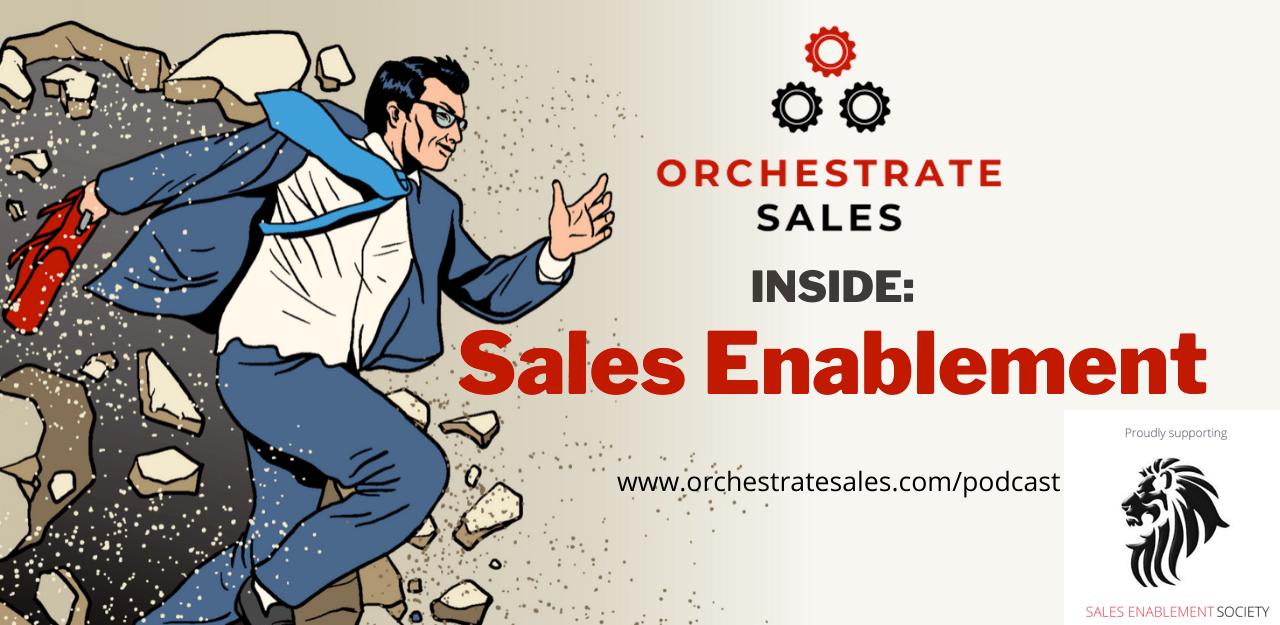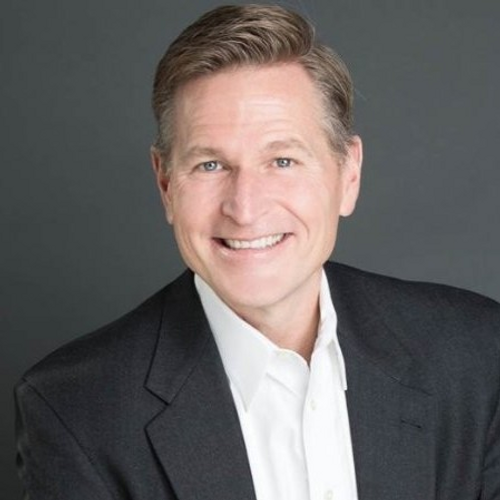Ep45 Blending Strategy & Tactics with Doug Clower
Welcome to the Inside: Sales Enablement Podcast Episode 45
A Sales Enablement Orchestrator and Sales Enablement Insider joins our show to talk about blending strategy and tactics. Doug Clower is a 20 year Sales Enablement veteran with orchestration experience in companies like MicroFocus.
Doug joins the podcast to talk about the changing sales landscape and how Orchestrating success with sales, marketing, and operations leaders requires bridging the gap between their company’s business strategy, and the way customers need to buy.
This creates space:
- Between your company and your customers
- Between your growth plans and activities to drive quarterly results
- Between accomplishing goals and driving daily priorities
- Between the sophistication of know-how and the simplicity of action
- Between managing individual contribution and customer experiences
- Among specialized functional departments
Companies are structured in hierarchical functional silos making them unable to react quickly to the business landscape.
Join us at https://www.OrchestrateSales.com/podcast/ to collaborate with peers, join Insider Nation, participate in the conversation and be part of the continued elevation of the profession.
EPISODE TRANSCRIPT:
Intro 00:02
Welcome to the inside sales enablement podcast. Where has the profession been? Where is it now? And where is it heading? What does it mean to you, your company, other functions? The market? Find out here. Join the founding father of the sales enablement profession Scott Sam Tucci and Trailblazer Brian Lambert as they take you behind the scenes of the birth of an industry, the inside sales enablement podcast starts now.
Brian Lambert 00:33
I'm Scott cantucci, Brian Lambert and we are the sales enablement insiders. Our podcast is for sales enablement, leaders looking to elevate their function, expand their sphere of influence, and increase the span of control within their companies.
Scott Santucci 00:49
Together, Brian and I have worked on over 100 different kinds of sales and a one end initiatives as analysts, consultants or practitioners. We've learned the hard way What works? And maybe what's more important, what doesn't?
Unknown Speaker 01:04
That's great. I guess it's been really hard lately.
Brian Lambert 01:08
That's got to take us up with a centering story. We're bringing back our centering story, a couple of podcasts and panel discussions and our listeners are clamoring for a story, Scott, I think it's time to go back in history. I can feel it. What do you got for us?
Scott Santucci 01:24
Well, this time, we're gonna have to go way back the Wayback Machine. And I'd like us to imagine what the year 1271 was like.
Brian Lambert 01:35
Wow, yeah.
Scott Santucci 01:37
Good times, right. This is pre pleg. Europe, by the way. So good, you know, good stuff. In 1271, a 17 year old left Venice, with his father to go off to China. And who was that person? Well, that's what people today know as Marco Polo, and Marco Polo is not famous for that pool game. Follow. That's, that's not what he's about. That's not what he's famous for. He's actually famous for his time spent in China. So we remind ourselves that in Europe during 12, you know, 1271 right when when our when our story is that the largest cities in Europe had about 20,000 to 40,000 people that was considered a huge city and European standards. And the big thing that was emerging here was the mercantile system. So trade, and the Venetians were probably the biggest innovators of that. So they, if you know about Venice, it's this little island. They have great shipbuilding. So they sail all over to establish trade routes. And one of the things of course, you want to always stop washes trade with China because China has has silk between 1271 and 1295. He spent a lot of time in China and what makes him particularly important is that he caught the attention of kubla Khan and Quba Khan was basically the Emperor of China at that time. And Koopa Khan somehow got impressed by young Marco Polo. so impressed he was impressed by he was he thought he was witty. He was impressed by his humility and his curiosity.
And what's so fascinating about this is Quba Khan basically gave Marco Polo this Emperor's pass into all at all China, he could go anywhere. And with a with a military support bond, I mean, he could do what ever he wanted. guba Khan was so impressed by Marco Polo Khan and he represented China. As an ambassador to India, and Burma, so what? because of who he was because of his intellect. And because of his curiosity, he captured a lot of stories. When he got back in 1295, he got back to eventually got back to Venice. And Venice was at a war with Genoa. So we've got to keep in mind during this period of time, these were city states, right? So, Genoa is where Christopher Columbus is from, by the way, is a city just, you know, on the other side of the peninsula of Italy, and they were at war. And within a year of coming back home after being gone for 25 years, he gets captured by the Geneses. And so while he was in prison, he wrote about his his stories. And his stories were so impactful. Because they tell they told they told stories about an accounts of how Chinese cities were had running water and sanitation. They had over a million people in many, many of the cities, which was incomprehensible for anybody in, in western civilization to understand but the accuracy and the depictions made people become curious. They're the economy that China had they were the first people to go to a paper currency or a fiat currency is that kind of economics called it and a lot of those principles. The event the mediation use behind their form of currency, which is the Duckett, which became the standard for many many years before was replaced for the foreign. And another interesting thing about that is Marco Polo influences. A lot of us associate pasta with Italian cuisine, but they actually got that from the Chinese. So that's, that's my, that's my centering story is a go off to foreign lands, get some, get some different information, put things together, come back, and if you You're really curious and positioning a different way. You can start laying the seeds for, say, maybe a resin Renaissance.
Brian Lambert 06:10
Nice. So this is very exciting. Not only have I learned where pasta really came from, we're also going to get to use our new sound effect that we recorded with our panel, Scott and that's the So what does this have to do with sales enablement?
Scott Santucci 06:26
Well, that's a good question Brian's and taking a big step back, we can focus in sales enablement, professionals on the daily tactics and what we do and what our jobs are. Or we can take a step back and look at the overall patterns and one of the overall patterns is we're responsible for change. We're responsible for finding new ways of doing things we're responsible for getting a lot of other people together we're responsible for orchestrating a lot of people in the reason I like the story is it highlights how big some of the gaps are between different worlds. So let me elaborate on that a little bit. So we talked a little bit about Cuba Khan. And I don't expect everybody to know, middle age Chinese history, but could what's how you might recognize that name guba Khan. He's the grandson of somebody called jingis Khan. And Ganga is Khan just two generations ahead, lead a massive slaughterhouse. So one of the most ruthless and effective leaders of of all time, and he threatened much of Europe as a matter of fact, he threatened a lot of elements of the of the Roman Empire, the Byzantine side and it created a lot a lot a lot of problems.
So you have this overall fear or belief that these Mongols all all in Western Europe, have a shared view that the Mongols are this horde is barbaric horde of people ride on horseback without, you know, holding their meat together between their legs to and that that and they ate that raw meat, but they were seasoning it so repulsive. And that's what the Western culture thought. Here Marco comes back, Marco Polo comes back, and he's telling all these stories about Cuba Khan, who everybody knows is the grandson of Genghis Khan, and this massive civilization that he's got going on in this thriving economy. So it's, it's this huge shift of it, you know, not only is the idea of a million of a city with a population of a million people, hard to understand, or paying things with paper, just completely hard to understand.
Brian Lambert 08:47
So this was he saw people actually people actually knew that Asia existed, or they've heard of him,
Scott Santucci 08:55
but they like maybe earth was round two, right?
Brian Lambert 09:01
They just said never been there. So when he starts bringing back details, that's the
Scott Santucci 09:06
well Pete they knew a lot, right? So they knew about, you know, the riches, the spices, the silk, they knew all of those things. What happened is during Quba Khan's reign, he modernized a lot of things so he built a whole new dynasty. And it's the modernization of all of these things and the thrive you know, the the period of Thrive ness and prosperity that was happening in China is just really hard to comprehend. Not only are the results card to comprehend but the fact that this is the grandson of of Guinness Khan remember in Europe at that time you were born in and your last name was Miller because that's what you did. You were a Miller or Hooper, you you made. You made barrels. Your name was what you did and what you did was who You are. And here you've got what was the name con means conquer. Right? So you think he's a conquer and it just you can't imagine something different. So it's this this, this creating the space to be able to comprehend it. It was so the resistance to Marco Polo story were so hard. You can even go into Venice today. And they have a section I don't know the exact Italian, but they called him a bragger. And the priest at the time, when he was on his deathbed, they were still trying to get him to confess. Come on, Marco. Good minute, you were making stuff up to be famous. And he wouldn't admit he's like it frankly. I left half the stories of the things I saw out of here because I didn't think you
Brian Lambert 10:46
would believe them. You guys are making up words. Yeah, making up words man making up concepts. So
Scott Santucci 10:52
why does this matter? Why is framing this matter so much? Well, it matters because where we are today in our business is we're going through a similar revolution. We want to, we want to apply digital. And we think we know what digital means just like the western civilization thought they knew who kangaskhan was. But digital is much more like kubla Khan, it's it's a completely different viewpoint than what we think it is. And all of this stuff creates so much friction, how how our businesses are changing. So create space, just like there was massive distance. There's geographic distance between Western Europe and China. There was cultural space. There's philosophical space, there's all standing pace cultural space. So let's look at where we are today. We have a growing space between your company and your customers. We have space between the the growth plans coming from management, and all of the activities that people know for sure of what needs to be done to drive quarter results. We have space between accomp people who think about accomplishing goals. And then people who think about driving daily activities and doing tasks and getting stuff done.
So we even have space between how how we actually go about working, we have space between the sophistication of know how subject matter experts, and then space between other people say, Hey, we have to simplify this for action, and take a little bit of all of these different parts and string them together. We can't even agree on that. We have space between managing individual contribution and saying, Hey, I as an employee, and then valued because of these earned by contributions, yet at the other end, customers don't really care about individual contributions. They care about their experience, and what does that look like? So we have space between that and then we have space among all of the specialized functional departments. So that's how we tie it all together. And because The way that we're structured, just like the way Western civilization was structured in terms of their thinking, their culture, etc, made it very difficult for, for Europe to buy in, it took really a plague to get people in a more coachable moment. We're in a very, very similar spot today. So that's that's why that story is relevant.
Brian Lambert 13:21
Yeah, it's amazing. And it's interesting, because the more you dwell in the space there, the more the space becomes real. And so Marco Polo dwelled in the space and he came back with stories and people thought he was crazy. And he was bragging. And the space though actually has definition people occupy space activities that occupy space thinking, structures, processes, there's a lot of stuff in the space. So it's a paradox between, there's nothing there, nothing to see here. Move on. And boy, there's a lot of things happening there. And I love this concept for the podcast. Cast today, let's let's dwell on the space, right? And to help with that I'm bringing in and we're bringing in Doug clower, who's one of our orchestrator, friends. And he's also been a listener of the inside sales enablement podcast. So he's a, he's a member of the insider nation. I, Doug, how you doing?
Unknown Speaker 14:20
I'm doing well. Thanks, Brian. And Thanks, Scott. Thanks for having me on today.
Brian Lambert 14:25
Absolutely. And what do you think? I'd love to hear your reaction to the Marco Polo framing story, and then how that relates to your thinking and then just tell us a little bit about yourself?
Unknown Speaker 14:41
Well, you know, right, right up front, the Marco Polo story is so compelling because it talks about us living in a world that we perceive, but then looking at a different role and seeing it's so much different and understanding what the the differences are Between the two sides, it's just wow, the exploration that he went through the the mind blowing experience that he had to have had at the time, it was certainly eye opening and something he was able to bring back to the Western civilization, even though, as you described Scott, they didn't believe it. And he didn't tell him everything because he didn't think they would. So it's important for us to remember that we sometimes have to put ourselves in the other person's shoes, think about what they see, etc. So it's kind of an important thing. These webcasts, these have been so helpful for me in terms of evolving some of the things I think about helping me put my feet in the other person's shoes, putting my my feet in the shoes of say, the canals of the world who, from a private equity standpoint, what do they see? What are they looking for, thinking about other things that have been happening? So it's really important. My background is is in a consulting type of side of the house, I started off as an architect, which is sort of a consultative selling kind of thing. I transitioned in it and was managing the sales of products for small business small partner, and then evolved over the time into an enablement role, which was so exciting because it was a new territory, a new venture. And so my background is really in, in sales excellence. And that's really what I'm passionate about. I, I sort of tag myself these days as an enablement guru. I have now started tagging myself as an orchestrator. And I continue to expect to do that. So
Brian Lambert 16:50
awesome. Yeah. And this idea of orchestrator let's let's talk about with Scott and it's really have a conversation here. In The space that orchestrator comes from. So this space that that exists, I'd love to explore it a little bit. And let's have a conversation. Doug, I'll start with you. When you went through, as you alluded to the webinars, and I know you've listened to the show, let's let's go back a little bit into the first webinar, our second webinar that Scott did, which was the state of sales enablement. And in that that webinar was the landscape of sales enablement and how it's evolving. And it was really grounded in the research that was happening in that in that time. It was about, I guess, two months ago now and what what can you share with regard to, you know, your story and how its unfolded over the last couple of months, and let's use that, that webinars and also these other touch points that you've had as a way to get our listeners up to speed on what's been happening.
Unknown Speaker 17:58
You know what, I'll tell you what Most enlightening about this and another example of me putting my shoes and somebody else's my feet in somebody else's shoes. I don't want to put my shoes on, I wouldn't like them. Anyway, the important thing is when I first went through the research and started looking at things I, I think my my visceral reaction initially was that our sales enablement resources, the people that were responding are way too tactically oriented. And I just, in my mind, I felt like sales enablement as a practice needed to be more strategic, etc. So I, I immediately just sort of pulled back from that. But as I started to think through that and started listening to things and being challenged by different stories and different points of view about this, I started recognizing how strategy and tactics have to be married in a way You know, I always said that tactics. Yeah, we have to do that. There's no doubt about it. But oftentimes, just like a recent book that I'm not a recent book, but a book that I've recently been reviewing or re reading, it really talks about the fact that there's got to be marriage, there's got to be an execution toward the strategy can't just say I've got a strategy and make it happen. So this concept of stratification, which is a term that first came up back then was so important and especially how it applies to thinking about enablement as a practice and evolving and moving forward toward the business within a business concept that Scott and you have have all begun to share with the rest of us. So it's really insightful and helpful. It's helped me transition to think you know, I have to think of it in total, I can't I can't break the two apart. Dismiss one side or the other.
Brian Lambert 20:02
Yeah, that's great. So let's use our Marco Polo analogy here. Let's say you're in the year in Europe, and Scott's Marco Polo, and he's went out, he went over there. And he, he, he taught he went through Asia. And he's bringing back all these stories about, in this case, in the modern era, the digital transformation, the impact of digital the impact of COVID the gaps that exists between...




